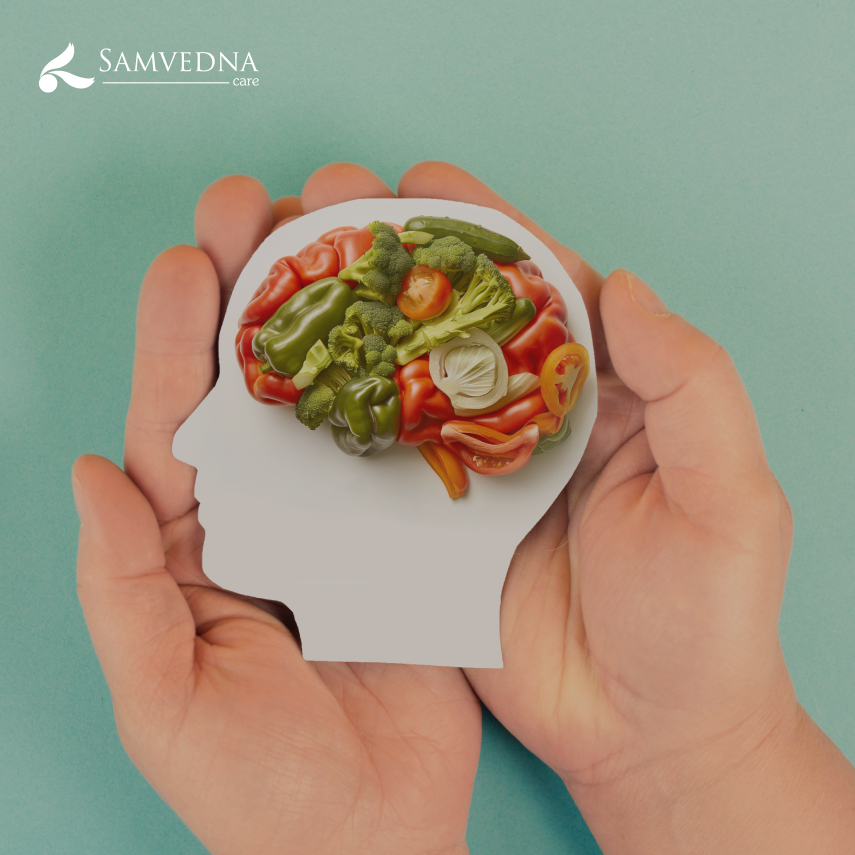Contact Us




In recent years, studies have shown how crucial diet can be for our mental and emotional wellbeing. While most people understand that nutrition impacts physical health, fewer recognize its role in mental health. For those experiencing depressive symptoms, a closer look at diet could open up additional pathways for support and healing. Here, we at Samvedna Care delve into the science-backed relationship between diet and depression with practical tips on how small dietary shifts may bring substantial mental health benefits. For individuals looking to deepen their understanding or seeking guidance, consulting with a mental health therapist can be an invaluable part of this journey.
1. The Gut-Brain Connection: How Food Affects Mood
The concept of the gut-brain axis illustrates a bi-directional relationship between the brain and the gut. Known as our “second brain,” the gut houses trillions of bacteria, collectively known as the gut microbiome, which play a key role in producing neurotransmitters like serotonin, often referred to as the “feel-good” hormone. In fact, approximately 90% of serotonin is produced in the digestive tract, linking digestive health closely with mood and mental health. This connection is particularly important for understanding mental illness, as disruptions in gut health can influence brain function and contribute to mood disorders.
Research on the gut-brain axis suggests that a balanced, nutrient-rich diet can help support mental health by promoting a healthy microbiome. This link between gut health and mental illness reinforces the importance of comprehensive care that addresses both physical and mental wellbeing.
2. The Impact of Nutrient Deficiencies on Mental Health
Certain nutrients have a direct impact on brain health, making deficiencies a potential contributor to depressive symptoms. Here are a few nutrients strongly linked with mental wellbeing:
3. The Role of Sugar and Processed Foods in Mood Swings
For many individuals, depression and other mental health challenges can lead to emotional eating, a cycle in which food is used to cope with difficult emotions. This often involves reaching for high-sugar, processed foods that temporarily boost mood due to their impact on dopamine, the brain’s “reward” chemical. However, this quick fix is usually followed by a rapid drop in blood sugar, which can worsen mood swings, irritability, and fatigue, trapping individuals in a cycle of cravings and emotional eating.
Over time, diets high in sugar and processed foods can increase inflammation in the body, a factor that may contribute to the onset and exacerbation of depressive symptoms. The inflammatory response impacts brain function, leading to impaired emotional regulation and increased susceptibility to mood disorders.
To help break the cycle of emotional eating, nutrition experts suggest choosing whole foods like fruits, vegetables, and whole grains that provide steady energy and blood sugar levels. Making these dietary shifts, combined with support from a mental health therapist, can help manage depressive symptoms and reduce the impact of emotional eating, leading to improved overall emotional stability.
4. Mediterranean Diet and Mental Health: A Proven Approach
One of the most researched diets in connection to mental health is the Mediterranean diet, rich in fruits, vegetables, whole grains, nuts, seeds, and healthy fats like olive oil. Studies have shown that this diet not only reduces inflammation but also lowers the risk of depression. A 2017 study published in BMC Medicine found that adults who followed a Mediterranean-style diet showed a significant improvement in their depressive symptoms.
The diet is especially beneficial due to its combination of mood-supportive nutrients, including omega-3s, antioxidants, and fiber, which together support gut health and reduce oxidative stress on the brain.
5. Practical Tips to Support Mental Health Through Diet
Small changes can make a big difference in the connection between diet and mental health. Here are a few strategies:
While diet plays a valuable role in supporting mental health, it is not a standalone treatment for mental illness. Depression and other mental health conditions require a multi-dimensional approach, which may include therapy, medication, exercise, and a strong support network. At Samvedna Care, we believe in empowering individuals with knowledge about nutrition while providing access to holistic mental health resources. With the right combination of dietary support, professional guidance, and therapeutic intervention, individuals can enhance their mental health and resilience.At Samvedna Care, we believe in a multidimensional approach to mental health, where nutrition, therapy, exercise, and support systems work together to build resilience and well-being. Dietary changes offer one of the many pathways to nurturing a healthier and happier mind for those seeking support.